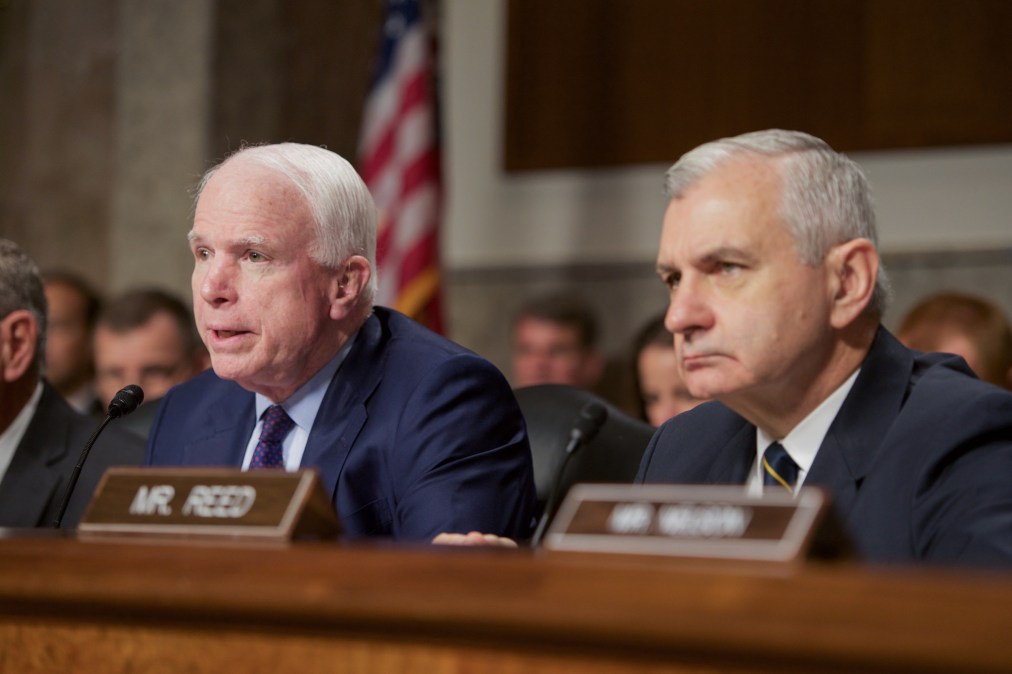Senate NDAA gives marching orders for Pentagon’s JEDI cloud

Editor’s Note: This story has been updated with information about the House’s defense spending bill.
The Senate Armed Services Committee, like its counterpart in the House, has set some requirements in its version of the 2019 defense authorization bill for the Defense Department’s massive acquisition of commercial cloud services, hoping to see the department get its ducks in a row for a smooth migration.
Whereas the the 2019 House National Defense Authorization Act threatens funding of the Pentagon’s multibillion-dollar Joint Enterprise Defense Infrastructure commercial cloud acquisition without proper reporting on the acquisition, the Senate’s draft bill is much more supportive of the contract — foremost requiring the department take the necessary steps, like adding “advanced commercial network capabilities,” to prepare for the unprecedented cloud migration and ensure that it’s successful in the long-term.
Within 90 days of the bill’s enactment, the DOD’s Cloud Executive Steering Group would have to “develop an approach to rapidly acquire advanced commercial network capabilities, including software-defined networking, on-demand bandwidth, and aggregated cloud access gateways, through commercial service providers…” In addition to easing the migration, this would “increase visibility of end-to-end performance to enable and enforce service level agreements for cloud services,” “ensure efficient and common cloud access” and “facilitate shifting data and applications from one cloud platform to another,” among other things, the bill says.
The bill’s language seems to suggest that if the JEDI commercial cloud is the DOD’s preferred strategy to modernize its systems, then it should be all-in and its preparations should reflect that. It calls for the steering group to review all workloads or applications that it hopes eventually to migrate to JEDI and reassess if it will actually migrate them or perhaps terminate them. On top of that, the bill limits any new system or application development led by the steering group to be “already, or can and would be, cloud-hosted.”
The bill briefly addresses the JEDI acquisition strategy, which the DOD, despite continual criticism, has maintained will be a single award contract, particularly in a recent report to Congress, including the Armed Service Committee in each chamber. It doesn’t set any specific requirements to reassess that decision, but it broadly hints that the committee would prefer to see the Pentagon issue more than one award for the procurement.
“The Deputy Secretary shall ensure that the acquisition approach of the Department continues to follow the Federal Acquisition Regulation, including part 16.504(c) of such regulation, regarding procedures relating to the preference for multiple awards,” it says.
Meanwhile, the House Appropriations Committee also released its preliminary defense spending bill Wednesday with JEDI in its crosshairs. It would restrict funding of the program and the department’s other massive cloud contract — the $8 billion Defense Enterprise Office Solutions led by the Defense Information Systems Agency —until 90 days after Secretary of Defense Jim Mattis submits a letter proposing a budget accounting system for all funds spent on DOD cloud computing, as well as “a detailed description of the Department’s strategy to implement enterprise-wide cloud computing.”
The DEOS procurement focuses more on modernizing the Pentagon’s enterprise business communication, collaboration and productivity applications, whereas JEDI has been described as a commercial cloud procurement meant to serve as the foundation for the DOD’s next-gen, emerging tech capabilities.
As part of that report, Mattis must also include a “strategy to sustain competition and innovation throughout the period of performance of each contract, including defining opportunities for multiple cloud service providers and insertion of new technologies; and an assessment of potential threats and security vulnerabilities of the proposed cloud computing strategy, and plans to mitigate such risks,” the bill says.
The final request for proposals for the JEDI contract, expected in May, could drop any day now. Or it could be a while — the Pentagon didn’t have any specifics on the delay when asked in a recent press conference. Spokesperson Dana White called it an “events-driven RFP” that “we are still working on.”
“So we are working on it, but it’s important that we don’t rush toward failure,” White told reporters. “This is different for us. We have a lot more players in it. This is something different from some of our other acquisition programs because we do have a great deal of commercial interest. We are going to the commercial sector for it.”






